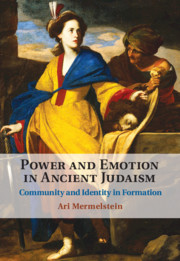Book contents
- Power and Emotion in Ancient Judaism
- Power and Emotion in Ancient Judaism
- Copyright page
- Dedication
- Contents
- Acknowledgments
- Abbreviations
- Introduction Power and Emotion in Ancient Judaism
- Part I Jewish Emotional Resistance to Gentile Power-Over in the Greco-Roman Diaspora
- 1 Emotional Resistance to Physical Power-Over
- 2 Emotional Resistance to Domination
- 3 Resistance to Emotional Stereotypes
- Part II Jewish Emotion Discourse in Response to Divine Power-Over
- Part III The Dead Sea Sect As Emotional Community
- Conclusion
- Bibliography
- Primary Source Index
- Modern Author Index
- Subject Index
2 - Emotional Resistance to Domination
Feeling Rules as Proxies for Power in Joseph and Aseneth
from Part I - Jewish Emotional Resistance to Gentile Power-Over in the Greco-Roman Diaspora
Published online by Cambridge University Press: 04 June 2021
- Power and Emotion in Ancient Judaism
- Power and Emotion in Ancient Judaism
- Copyright page
- Dedication
- Contents
- Acknowledgments
- Abbreviations
- Introduction Power and Emotion in Ancient Judaism
- Part I Jewish Emotional Resistance to Gentile Power-Over in the Greco-Roman Diaspora
- 1 Emotional Resistance to Physical Power-Over
- 2 Emotional Resistance to Domination
- 3 Resistance to Emotional Stereotypes
- Part II Jewish Emotion Discourse in Response to Divine Power-Over
- Part III The Dead Sea Sect As Emotional Community
- Conclusion
- Bibliography
- Primary Source Index
- Modern Author Index
- Subject Index
Summary
Contests over power, as we saw in our analysis of 4 Maccabees in the previous chapter, are really contests over emotion. In physical displays of power-over, emotion discourse governs the power dynamic between the parties, determining whether the impact of power-over actually serves to empower the oppressed party. Yet physical oppression is only one form of power-over. In relationships of domination, one party uses power-over to secure the compliance and shape the behavior of those who are subject to it without resorting to physical force or coercion. In such cases, the two parties in the power relationship do not necessarily encounter each other, and the force exerted by power is subtle. Focusing on the book of Joseph and Aseneth, this chapter expands our understanding of the intersection between power and emotion by exploring the role that emotion discourse plays in arranging the relations between parties in scenarios of domination.
- Type
- Chapter
- Information
- Power and Emotion in Ancient JudaismCommunity and Identity in Formation, pp. 62 - 98Publisher: Cambridge University PressPrint publication year: 2021

